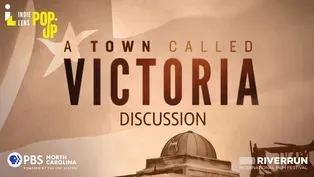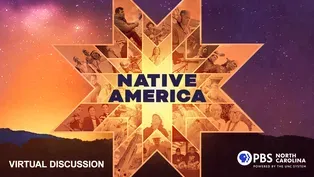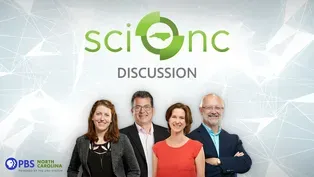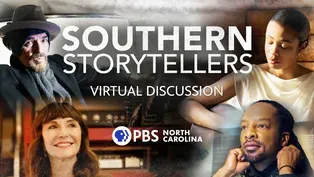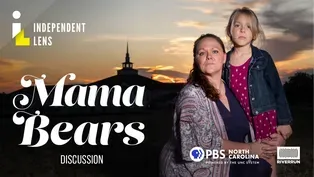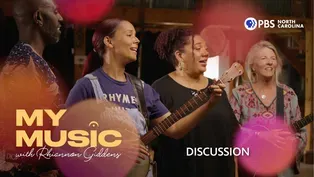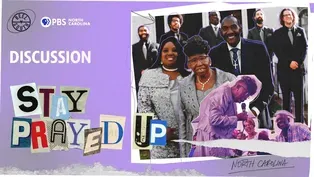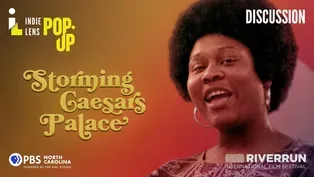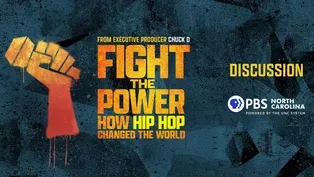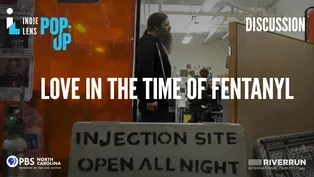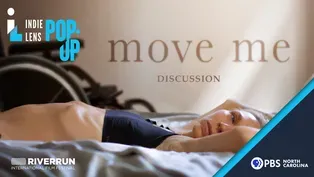PBS North Carolina Specials
Discussion | 9to5: The Story of a Movement Independent Lens
1/5/2021 | 39m 3sVideo has Closed Captions
Panelists discuss the women's movement in the 1970's—fighting for workplace rights.
Karen Nussbaum, one of the founders of 9to5, discusses how she organized a group of Boston secretaries in the early 1970s, and formed a union. The conversation covers current workplace challenges resulting from the COVID-19 pandemic, and the fact that the Equal Rights Amendment has not been ratified in North Carolina. Learn what organizers are doing today.
PBS North Carolina Specials
Discussion | 9to5: The Story of a Movement Independent Lens
1/5/2021 | 39m 3sVideo has Closed Captions
Karen Nussbaum, one of the founders of 9to5, discusses how she organized a group of Boston secretaries in the early 1970s, and formed a union. The conversation covers current workplace challenges resulting from the COVID-19 pandemic, and the fact that the Equal Rights Amendment has not been ratified in North Carolina. Learn what organizers are doing today.
How to Watch PBS North Carolina Specials
PBS North Carolina Specials is available to stream on pbs.org and the free PBS App, available on iPhone, Apple TV, Android TV, Android smartphones, Amazon Fire TV, Amazon Fire Tablet, Roku, Samsung Smart TV, and Vizio.
Providing Support for PBS.org
Learn Moreabout PBS online sponsorshipMore from This Collection
Discussion - A Town Called Victoria - Independent Lens
Video has Closed Captions
The filmmaker and former Victoria residents share their story. (46m 51s)
Discussion - Native America Season 2
Video has Closed Captions
Panelists discuss preserving the languages of Native American tribes. (39m 1s)
Video has Closed Captions
Sci NC executive producer and host, Frank Graff, chats about upcoming Season 6 of Sci NC. (26m 6s)
Discussion - Southern Storytellers
Video has Closed Captions
Author David Joy and others discuss storytelling and their new PBS series. (42m 13s)
Discussion - Mama Bears | Independent Lens
Video has Closed Captions
Producer and director Daresha Kyi discusses the film and LGBTQIA+ advocacy. (34m 41s)
Discussion - My Music with Rhiannon Giddens
Video has Closed Captions
Discussing the series with producers Will & Deni McIntyre and country artist Rissi Palmer. (39m 56s)
Discussion - Free Chol Soo Lee | Independent Lens
Video has Closed Captions
Local lawyers, professors and nonprofit leaders discuss wrongful convictions and reentry. (40m 44s)
Discussion - Stay Prayed Up, Reel South
Video has Closed Captions
The filmmakers discuss their journey with Mother Perry and The Branchettes. (45m 4s)
Discussion - Storming Caesars Palace | Independent Lens
Video has Closed Captions
Local professors and nonprofit leaders discuss welfare and the social safety net. (33m 2s)
Discussion - Fight the Power: How Hip Hop Changed the World
Video has Closed Captions
Local experts discuss the history of hip hop with PBS North Carolina. (59m 43s)
Discussion - Love in the Time of Fentanyl | Independent Lens
Video has Closed Captions
Local harm reductionists, therapists and others discuss the opioid crisis and more. (55m 44s)
Discussion | Independent Lens: Move Me
Video has Closed Captions
A dancer with blindness and disability advocates discuss adaptable arts programs. (38m 46s)
Providing Support for PBS.org
Learn Moreabout PBS online sponsorship- Good evening, everyone.
Rachel Raney here from UNC-TV, PBS North Carolina.
Thank you for joining us.
I absolutely love this Independent Lens documentary that we just screamed for you, "9to5: The Story of A Movement" Of course, I had seen the Hollywood movie when I was a kid but I did not know the real story of these inspiring female office workers and the organizing that they did almost 50 years ago.
And of course, maybe unfortunately the documentary is so timely.
I've read dozens of articles and think pieces on how devastating the coronavirus pandemic has been for working women, especially working mothers.
And on the other hand we just heard about Google workers organizing.
So these issues are completely still forefront.
So, to discuss the film and these ongoing struggles for workers and women's rights, we have some very special guests here this evening to answer some of my questions but more importantly, some of yours.
So I would like to extend a very warm welcome to and you will recognize Karen Nusssbaum, who was in the film.
She's the founding director of Working America and founder and director of "9to5" We also have MaryBe McMillan who is the president of the North Carolina State, AFL-CIO and Audrey Fannin Muck, who is the treasurer of the ERA North Carolina Lions and the filmmaker of "Brazen Belles" a documentary about the woman's movement from South Carolina.
So welcome to all of you and thank you for being here with us tonight and many thanks to all of the folks that have logged on and watched the film and are here for the conversation.
Karen, I wanna go to you first, since you are so integral to this story and appear in the film.
Before I do, I just wanna say as a woman who entered the workforce in the 1990s, thank you.
Thank you for everything that you did for all of us that came after.
We pause the film and I hope all of you will forgive us because we really, this is a 90 minute film that's gonna air on PBS and on UNC-TV later this month on, well actually February 1st, Monday, February 1st.
So we paused the film to give us time to have a nice juicy conversation here, but Karen you can help fill in some of the blanks.
The film goes on to two years later after the vote, what did that feel like?
How did you all pick up the pieces and continue organizing and fighting the good fight?
- Well, first thank you, Rachel and thanks to MaryBe, who's a long friend of mine and does fantastic work and to Audrey who I'm so anxious to hear about the work that you've been doing as well.
The movie ends at a crushing defeat, but we didn't stop.
We were devastated that night but we were a team and that we wouldn't, it never occurred to us that we would walk away from this.
And so we kept organizing, we reinforced each other we stayed on the ground.
And when management made mistakes we were there and people became angrier and angrier, the working women on campus.
So that within a couple of years we then won a resounding victory and then had this massive fight for our first contract.
And it was the most militant strike I've seen, these conservative women from Southern Ohio were out there making noise and chanting and raging through the buildings.
And it's that kind of strength that you can build when you're that dedicated to organizing and organizing across the barriers that usually divide people.
- Thank you and there's much more so I do really wanna encourage everyone to watch the rest of the film when we air it on February 1st.
Karen, how is it watching the film for you?
I know probably tonight wasn't the first time you've seen it but reliving the birth of "9to5" what does that hold for you?
- At least for me, my mistakes are so much more vivid than my successes.
The things that I did right always pale in comparison to the way I remember the things I did wrong.
And so the film has been fantastic.
It's raised the huge success of what we did the spirit with which we approached it our intention in, we were so intentional about organizing black and white women, organizing women who are middle-class and working class.
We did it with such fun and accessibility.
We never created these litmus tests for people to have to show that they were good enough to be organized by us and we had a strategy.
And so I think that to be reminded of all of that and how those elements are the essential elements in any kind of good organizing, I think and that it does speak to us today.
- Speaking of today, what's changed and maybe what hasn't, in your opinion in the workplace for women.
- Yeah, I think that younger like yourself are astonished at some of the things that we had to, that were taken for granted when I was just entering the workforce and when we first started out organizing and surely women we all have much more respect, much more opportunity than we did in those days.
But we ran right into the 1980s when there was this massive backlash, a corporate backlash, a right wing backlash that affected both women's organizing but even much more profoundly worker organizing in unions.
It was a huge attack on unions.
And so now what we've ended up with, I think is a country full of self-reliant women who don't have any power.
And that we see that in our actual working conditions today where pay and benefits, the living standards for working families is unbelievably lower than it was in those days.
That we may have more equality but it's an equality that's put all of us at a lower standard.
And that it's that battle, the battle for organized powerful working families that I think is the most important thing for us to take up right now.
- Thank you for that, Karen.
And that is a perfect segue cause I wanna go to MaryBe McMillan next.
Welcome MaryBe.
You are president of the North Carolina State AFL-CIO.
We're all super familiar with those initials but tell us a little bit about your organization.
- Thanks, Rachel.
And first, I just wanna thank you and UNC-TV for previewing this wonderful documentary and like you, I wanna say a deep appreciation and gratitude to Karen and to the founders of "9to5" not only for what they did to improve conditions for women in the workplace, but for all they did to forge a path for women leaders in the Labor Movement.
I'm one of nine women to lead stay AFL-CIO chapters in the country.
And I know that I stand on the shoulders of Karen and so many other women leaders before me.
And so just deep appreciation and gratitude for them blazing that path for me and for so many other women in the Labor Movement.
We are the state chapter of the AFL-CIO.
We are the Federation of our States labor unions representing over 100,000 working women and men in the public and private sector from nurses to letter carriers to symphony musicians to auto workers, factory workers, professional athletes we're a diverse and broad movement.
And we work to amplify the voice of working people to build the political power we need to win higher wages, safer jobs and better policies for all working people.
And right now we're really focused, unfortunately, on trying to mitigate the devastating impacts of COVID on working people.
We have hundreds of thousands of workers who are jobless because of this pandemic who every day are wondering how they're gonna feed their families and pay their rent.
And then on the other hand, we have all these essential workers who have been working harder than ever to make sure we have foods, to deliver our mail and medication to take care of us.
And so, on the one hand we are fighting for better unemployment benefits and relieved for those who cannot work while at the same time fighting to make sure that our essential and frontline workers are safe on the job.
So that's our focus right now.
And I would say to anybody that's out there that saw the movie, we need to keep pressure on our federal and state representatives to keep workers afloat and to keep workers safe in this pandemic.
- Yeah, absolutely.
I'll never forget walking into, well, a grocery store I won't name names.
And realizing that all of the workers in there were wearing all their own masks and, we've all seen people struggle to keep themselves safe in the workplace right now with what's going on.
- Absolutely.
- That's really important work.
Many of us have heard of the Fight for 15 which has really been on the covers of newspapers and maybe we know people who've been involved in that.
Tell us a little bit about how that has unfolded across North Carolina and some of the wins across the country.
- And if you see the entire movie, you'll see it guided the Fight for 15.
And I really do think that the Fight for 15 is kind of the next stage of the 9to5 movement because we see just so many women in these low wage service and retail jobs, and especially here in the South.
We live in the richest country in the world yet our minimum wage hasn't been raised in over a decade, 7.25, it's a poverty wage.
And we are seeing fast food servers, home health care aids, our grocery clerks saying, we're not gonna take it anymore.
And so they have hit the streets and it's made a huge difference.
We've seen, companies like Starbucks and TJ Maxx raise wages.
I think it's 29 States plus DC have raised their minimum wage.
Countless cities have taken action.
And that all happened because people got in the streets.
And I really think about when I saw this documentary what "9to5" was able to accomplish.
And when I think about the Fight for 15, I always tell folks, and they have any doubts about, can we really make a difference.
Look, think about the Fight for 15.
When it started, people said $15 an hour, it's not possible.
People said that corporate giants like McDonald's could not be moved but when thousands of people take to the streets and when you have fast food servers joining with college faculty and manufacturing workers and you have civil rights and faith leaders standing shoulder to shoulder, anything is possible.
And so we've seen great strides in terms of raising wages.
And I think the lesson is corporate giants can be moved.
Our laws can be made better.
Together, we can make a real difference.
And I think together, we can make sure that we have equal pay for women that we can get the ERA ratified and passed that we can have a woman as president in the White House.
So I think we got to keep in mind all that we can do together and the Fight for 15 is a great example of that.
And it's also a great example of what "9to5" did in terms of developing rank and file leaders in the labor movement.
It's a different style of leadership that women are bringing to the labor movement.
It's not about one charismatic leader.
It's not about one of us.
It's about all of us and developing a leaderful movement.
And I see that in the Fight for 15 too.
- I was so heartened.
I have kids who were in the Durham Public School System, and I was so heartened when news came out, it was fairly recently in the last couple of months that they were gonna start paying school bus drivers and cafeteria workers, $15 an hour.
So it really is spreading, it's really great to see.
Thank you MaryBe for that.
- Absolutely.
- And thank you for bringing up the ERA, we have tonight as I mentioned, Audrey Fannin Muck with us.
Audrey, fill us in a little bit about the battle to get the ERA passed here in North Carolina.
It hasn't been ratified here in North Carolina or nationally, but some other states have ratified us.
So tell us a little bit about that.
- Well, we're working hard here in North Carolina to get the North Carolina General Assembly to ratify the ERA.
On the national front, last January Virginia became the 38th state to ratify the amendment which technically means it should be in the constitution.
However, as expected, there have been some lawsuits raised and so that's what's going on right now.
The ERA North Carolina Alliance has signed on to the Amicus brief for this lawsuit which is against David Ferriero who is the archivist of the United States.
So he's the person responsible certifying and publishing the amendment to the constitution and making it official.
And so a few years ago he was saying, when the 38th state ratifies, I'll do that.
But then last year he received guidance from the attorney general not to do that.
And so hence the lawsuits.
So that's where we are on the national level.
On the state level, the ratification bills have been introduced every year since 2015.
Last session, we had all of the Democrats sign on as co-sponsors for it.
And unfortunately none of the Republicans would do that which is just unfortunate because women are Democrats and Republicans and independents and green party.
And all ships will rise with the equal rights amendment.
So we're continuing to work on it.
We have plans to introduce it again this year.
There's gonna be, well, it's probably the week of January 25th.
- All right, well, we'll see how that unfolds.
Do you think that with a new administration coming in and a new attorney general, do you think there'll be changes on the national level of how that will be seen with 38 states now having ratified it?
- We are very hopeful.
We have an incoming administration that has said very clearly that they support the equal rights amendment.
And so we are asking them to go ahead and instruct the archivists to go ahead and publish the ERA as the 28th amendment to the U.S. constitution.
- So what will it mean for women when the ERA is finally ratified?
What will actually change?
- So, we've been talking a lot about equal pay and say pregnancy discrimination also.
There seems to be not as much protection for pregnant women in the workforce.
And these are laws that were passed.
Like The Equal Pay Act was passed in the early 60s the law to prevent pregnant women from getting fired from their jobs as fast in the early 70s.
And yet we still haven't attained that, right?
So we have just a very persistent wage gap and women are still being fired, not being given appropriate accommodations if they have like weightlifting limitations when they're pregnant.
I feel that the reason they're not being successful when these kinds of cases go to court really kind of hearkens back to something that Antonin Scalia said a few years ago, he said, "Certainly the constitution does not require discrimination on basis of sex.
The only issue is whether it prohibits it, it doesn't."
His words.
And so that was really eye-opening.
And so that's when I got involved in the ERA effort here in North Carolina because it really started to make sense.
Why are these sex discrimination cases when they get to court not being more successful.
And it's because we don't have the constitutional underpinning that we need.
So it's sex discrimination is adjudicated at a lower bar than racial discrimination, discrimination based on religion or national origin.
And so I think this is going to give us better standing in the courts when these cases move forward.
I think that's what's gonna change.
- Thank you for that.
Yeah, it's been a long road that the equal rights amendment it's been a very long journey decades and decades.
And thank you for your work on that.
We have a lot of questions from the folks that are tuning in tonight.
So I wanna go to some of them.
And MaryBe, I know that we talked a little bit about before that the whole issue of North Carolina being a right to work state is pretty complicated but we do have some questions about that.
They're asking, is there a way to no longer be a right to work state?
How do we get away from that?
And I'm not sure that everybody even knows what that means.
So sorry to complicate things here.
- So-called right to work isn't really what it sounds like.
It is, the bosses and their corporate politicians way of trying to limit workers right to organize.
And no worker has to be a member of a union.
I mean, there's federal laws that protect that but what right to work means especially right to shirk.
It means that workers that are represented by a union don't have to pay a penny towards the administration of that union contract and the negotiation to representation and grievances.
So it's really, it's unfair and it really undermines worker's right to come together and to organize.
And there is definitely a way that we can change that in North Carolina, it would mean changing our laws which means changing our general assembly.
Right now we don't have a majority of folks in our legislature who are sympathetic to workers and supporting our right to organize.
And North Carolina also has a prohibition on collective bargaining for public employees which means that, anyone that's a state, county or city employee that can join a union cause that's their constitutional right.
But it means that they can't collectively negotiate a contract around pay and benefits.
And North Carolina is one of only three states with that blanket prohibition.
So we have a long way to go in North Carolina in terms of improving workers' rights.
And the way we begin to do that is through education but it's also through our power of the vote.
And we need to vote in folks that will support repealing right to work and support our public employees having the right to collectively negotiate and have a collective voice at work.
- Thank you for simplifying what is probably a pretty complicated issue.
And that makes a lot of sense.
Let's see.
And I'm not sure who would be the best person to answer this of the three of you, but someone is asking what are the fundamental protections that are laid out in the National Labor Relations Act?
What do people really need to know about their labor rights?
- MaryBe-- - Karen, do you wanna take a stab at that?
- Or Karen, you can go ahead.
- No, I was just gonna suggest MaryBe, why don't you take it?
- I'm not a labor lawyer, I'll say that, but the National Labor Relations Act to me, it gave in 1935 it gave private sector employees the right to organize and collectively bargain which is one reason why it's so unfair that public sector workers don't have that right still here in 2021.
It laid out provisions around wage protections.
The National Labor Relations Act is a great piece of legislation, but unfortunately there's a lot of workers that are exempt from that which I think folks don't realize.
Like domestic workers, agricultural workers which is one reason why we need to fight to have them included, but there's rights that were allowed under that federal legislation but then there's so much more than needs to be done in North Carolina, not only are we a right to work state but we're also an at-will employment state which means that basically, you can be fired for any reason other than protected status.
You can't be fired for sexual orientation, religion or gender or those things.
But it's, I mean, there's really no protection as far as, while we have federal legislation it's so important that we fight in North Carolina to have better protections for working people here.
And I don't know, Karen if there's any other things that you wanna add about that.
- Yeah, I think the most important thing for most working people to know is that if you talk with one other worker, then you're protected you can't be fired for organizing or at least it's illegal to fire you for organizing.
And that if you get a majority of people in the workplace who say that they wanna join together in a single voice the employer is obligated to bargain with you.
So those are the two most important things to know about it.
As MaryBe says, it's not nearly, it hits a really old law and it only got worse instead of better since 1935.
There's a new law before the Congress called the PRO Act which will solve the problems that MaryBe is talking about.
And it should be a number one priority for the new administration.
- One of the things I loved about the film and Karen about your movement is it was so wonderfully diverse.
And someone is asking how do we ensure that intersectionality is at the front of equal pay for all women?
- By organizing, by building organizations that represent, that have members and leaders who represent all of the different interests and give people an opportunity to interact across barriers that they don't normally.
I think that we can find common cause is if we're, we can find common cause if we're in discussion with people who are different than we are and if we understand who can really solve our problem and in most cases it's our immediate boss or it's corporate power or it's the politicians that the corporations have bought.
And so it's a matter of starting at the grassroots and building up with a common enemy in mind.
- Audrey, what about with the fight to ratify the ERA?
Do you all work across race and class and ethnicity?
- Yes, we do.
We do.
We are an alliance of organizations from across the state.
And so yes, our membership is broad.
Our organizations that are working with us are very broadly represented.
Yes.
- I have a question here that says do you have any tips for negotiating in the workplace?
How can I ask for a raise?
It's very practical question.
- When I first started working.
When we started in 95, we realized that our main strategies for getting a raise were waiting till the boss was in a good mood.
And you come to realize that that's not really a very effective strategy on the whole.
And it really all has to do with the amount of power that you have.
It's the way you negotiate is that you've got a lot of power behind you.
So if you've got a majority of people in the workplace that's far more formidable than the best individual argument that you can come up with.
And any kind of a collective power is always gonna be better than individual power.
And that's why the Google employees are organizing.
They're nowhere near a majority, but hundreds of Google employees are a lot more powerful than one or two or 10.
- Someone here is asking what lessons can the modern or current day labor movements like Red for Ed and the Fight for 15 take from the 9to5 movement?
- MaryBe, that sounds like that falls in your lap being the current labor movement.
- Yeah, I do think that one of the lessons and I mentioned I see it in the Fight for 15 and Red for Ed, but I think it really is like we need to build a leader-full movement.
Like you need to develop and create opportunities for rank and file worker leaders to emerge because you don't have a movement if it's just built around one leader.
And I think that's critical.
So leadership development opportunities I think that persistence, just what their 9to5, they had the union defeat but they kept on fighting and then they won.
And you see that with the Fight for 15 has taken years but over those years there've been incremental victories.
And while victories, they often don't come as quickly enough or as dramatically as enough as we would like, we need to count what victories we do have and see the incremental progress and really develop a long term game, a long-term strategy which I felt like you really saw with 9to5.
It was not about just one workplace.
It was about building power for women throughout the country.
And I think that that's what we're seeing with both those movements, we saw teacher strikes in numerous states including North Carolina and Southern states and you're seeing that with the Fight for 15 really growing a nationwide 50 state movement that's in it for the long haul.
- Rachel to me, as I look back on the 1970s they are eerily similar to the 2020s.
That 1970 and now, they were periods of political upheaval with divisive, disgraceful presidents and economic people it was really the beginning of globalization and the end of a period of growth of the middle class in the United States and social upheaval, the blossoming of civil rights and women's organizing.
And all of those conditions are similar today.
And we thought we were on a roll and we didn't appreciate just how powerful our opposition was.
We need to learn the lessons of the 1970s so that we don't recreate the 1980s which were the consolidation of the new right in the United States and of a period of total corporate dominance of our politics.
We have to use the momentum that's building right now to overcome those kinds of obstacles so that we actually make the kind of breakthrough that we hope to make in the 1970s.
- That's a really interesting point.
And actually this question seems really kind of on point for that, is what advice do you have for beginning organizers?
Where should someone start if they wanna create change?
- From my point of view, it can't be about yourself.
It can't be about building a career.
It's gotta be because this is how you make things right in a wrong world and that you're doing it with other people.
We always believed in 9to5, that any victory was a victory of all of us and any defeat was not any single person's fault that you've got to go into this to build friendships and lifelong attachments to people because it's a lifelong project.
And so if you do that, if you're doing it because this is the right thing to do, because you'll love the people that you're working with and because you just can't walk away from what's wrong, well, that's the sound foundation.
- And I'd invite people to join this movement.
That's underway with the equal rights amendment here in North Carolina.
Come join us.
Our website is era-nc.org.
And we do petitions, we do advocacy.
We present to our local municipalities and counties gaining support for the Equal Rights Amendment talking with other people.
And what's amazing is that in this situation, something like 95% of Americans support women's equality under the constitution, 70 plus percent think the equal rights was already passed and is in the constitution.
We need to follow up behind that and just make that happen.
And we're working to make North Carolina the 39th state and we'd love to have you join us.
- And somebody had just asked that question.
So thank you for that.
You read my mind.
- And Rachel, I would just add, especially to younger organizers, don't be afraid to challenge the status quo and to bring new ideas because I think that, those of us who've been around for awhile, we can learn a lot from the younger generation of organizers and I think back to 9to5, when a lot of what y'all were doing Karen was kinda new.
And especially near to the labor movement to have a group of women making these challenges and taking the lead and really say to younger organizers, we need your ideas and your energy and your innovations cause we need to think differently cause the economy is changing around us and we need to change as well.
- So I wanted to get some final thoughts from each of you just kind of looking ahead when it comes to workers' rights or women's rights, what do you all see as kind of coming next in terms of the struggle for equality or equity, equality, and equity.
- To my mind, the most important thing we can do is build the powerful organizations that are going to last that you need outburst of energy, you need mass organizing.
You need throwing everything up in the air the kinds of things that are happening right now.
But unless you consolidate power in organizations that can really confront corporate power then you're victories are fade away.
And that's why unions are so important.
There is nothing like union power, organized power of workers to confront the organized power of employers.
It's what has devastated our economy the attack on unions, it's what means that there's no future for younger people to do better than their parents.
We need workers organizations, we always have and we need them more than ever now as we go into even more perilous times with climate change, with ongoing pandemics with unresolved racial injustice, we need the kind of multi faceted, multi-racial organizations that can stay the course.
- Thank you for that.
MaryBe, Audrey?
- Well, I absolutely agree with Karen.
The reason I'm in the labor movement is I believe it is the one force that can change this nation.
And if we join together working men and women across this country, I believe what's next is $15 an hour paid leave for all workers, the Equal Rights Amendment ratified, labor law reform, so that we have the freedom to organize and collectively negotiate.
I believe what's next to seeing women leaders throughout the labor movement and Congress and the White House.
I believe that together we can make a huge difference in this country and we can make things better for all working people.
- Audrey.
- And I think with the publishing of the Equal Rights Amendment is the 28th amendment to the constitution is going to strengthen workers.
I believe it's going to bring about fair and equal pay.
And when women do better, families do better.
And when families do better, communities do better.
And when our communities are doing better, our country does better.
And I think this is the direction we're moving in just slowly.
- So in other words, let's speed it up.
- Right.
- Well, I wanna thank all three of you, Karen, Audrey and MaryBe for joining and discussing this powerful film and the issues that women and all working people are facing today.
So thank you again.
And I wanna thank everyone who tuned in.
We had over 150 folks join us tonight for the screening and the conversation.
And I wanna encourage everyone to please let your family, friends and neighbors know about this film.
And again, we'll be airing it in its entirety on Monday February 1st at 10:00 PM on UNC-TV, PBS, North Carolina.
You can also, after February 1st, see it on the PBS app.
We have some wonderful partners on our screening events including the RiverRun International Film Festival and State Library, North Carolina.
So many thanks to them for their help with this event tonight.
This is the first in four of these first Tuesday events that we're gonna be doing of documentary screenings and panels this winter and spring.
So there was information about the three upcoming ones on the event bright and check your inboxes you'll be getting an email from us very soon with more information on how to register for those events and including a link to the conversation tonight if you missed any piece of it or wanna share it with folks.
So thank you all.
And lastly, I would be very remiss if I didn't encourage everyone watching tonight to please join and become a member of UNC-TV, PBS North Carolina if you liked what you saw tonight, and you wanna support Public Broadcasting.
Thank you all.
Have a wonderful evening and good night.
- Good night.
- Good night.
